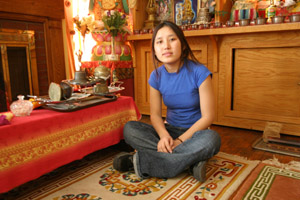Freshman holds on to Tibetan culture
by Pam Arnold, The Ithacan, April 14, 2005
Ithaca, NY (USA) -- Freshman Tenzin Zingshuk reached into her bookbag and removed a small square red silk ornament, adorned with traditional Tibetan decorations in gold-colored thread. Inside was an unknown substance ? probably sand or small seeds ? that had been blessed by a rinpoche, a high-ranking monk.
 << FRESHMAN TENZIN ZINGSHUK sits in the Namgyal Monastery, a symbol of Tibetan Buddhism in America, located on North Aurora Street.
<< FRESHMAN TENZIN ZINGSHUK sits in the Namgyal Monastery, a symbol of Tibetan Buddhism in America, located on North Aurora Street.
By Alexander Norelli / Staff Writer
Her mother gave her this gift as a symbol of protection. And it has accompanied her during her time away from her home in India. Though she has never been to Tibet, Zingshuk is trying to hold onto the culture and traditions of a land that her parents fled from more than 40 years ago.
?I would love to go to Tibet, I would like to see how it is. I want to see the Potala,? Zingshuk said.
The Potala is the 1,300-year-old palace in which the Dalai Lama, the spiritual leader of Tibet, lived until being forced to leave the country in 1959. Containing nearly 1,400 rooms, the palace is the omnipresent symbol of the Tibetan capital of Lhasa and of the country itself.?These days even if you go in there you are being watched every step you take, so you wouldn?t have the freedom to explore as you would if there were not the Chinese guarding it,? Zingshuk said.
In 1959, China gained control of the high-mountain nation of Tibet, claiming that the region was part of China. As a result, Zingshuk?s parents, both children at the time, were forced to flee the country. Her grandparents, who accompanied her parents in their emigration, were weakened by the harsh weather present in the Himalayan Mountains and died.
Eventually her parents settled in the Bylakoppe Tibetan settlement in southern India, where Zingshuk was born. The settlement is one of more than 80 in India housing more than 20,000 Tibetan refugees.
One of the reasons she decided to attend Ithaca College because her uncle?s family lives near the campus. Though both India and Tibet are on the other side of the world, she said having some family here makes things much nicer.
?Other than my mom, dad and brother, almost all of my closest relatives are in the United States, so it?s like my second family, so I do feel at home here, which is great,? she said. Zingshuk?s uncle, Karma Dorjee works at a local publishing company that specializes in Tibetan and Buddhist culture. He said learning about Buddhism is not difficult in Ithaca.
?We have a monastery downtown, which is a personal monastery of His Holiness the Dalai Lama,? Dorjee said. ?They run a meditation center, and there are monks over there from His Holiness the Dalai Lama?s office.?
Zingshuk said she is thinking about starting a club at Ithaca College for people to learn more about her ethnic homeland and the world?s fourth biggest religion.
Zingshuk said this summer she and a friend are going to read ?The Tibetan Book of Living and Dying? by Sogyal Rinpoche, and then discuss it, just another way she intends to further explore her culture.
In 2000, Zingshuk and her father met the Dalai Llama in India.
?It was a small ceremony, and there were just a few Tibetans lined up, just officials, plus me,? she said. The Dalai Lama?s name is actually Tenzin Gyatso, and it is because of this that the name is very common among Tibetans and Buddhists. Tenzin means ?holder of Buddhist doctrine.?
?It was such a good moment for me, I was so glad,? Zingshuk said. ?He shook my hand and there I was, shivering?I didn?t expect that to happen because normally you would never get such a close blessing from His Holiness.?

 << FRESHMAN TENZIN ZINGSHUK sits in the Namgyal Monastery, a symbol of Tibetan Buddhism in America, located on North Aurora Street.
<< FRESHMAN TENZIN ZINGSHUK sits in the Namgyal Monastery, a symbol of Tibetan Buddhism in America, located on North Aurora Street.